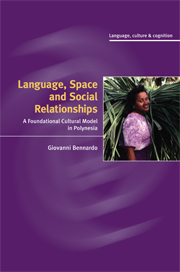
-
Select format
-
- Publisher:
- Cambridge University Press
- Publication date:
- 19 August 2009
- 14 May 2009
- ISBN:
- 9780511581458
- 9780521883122
- Dimensions:
- (228 x 152 mm)
- Weight & Pages:
- 0.75kg, 396 Pages
- Dimensions:
- Weight & Pages:
You may already have access via personal or institutional login- Series:
- Language Culture and Cognition (9)
Book description
The study of the relationship between language and thought, and how this apparently differs between cultures and social groups, is a rapidly expanding area of enquiry. This book discusses the relationship between language and the mental organisation of knowledge, based on the results of a fieldwork project carried out in the Kingdom of Tonga in Polynesia. It challenges some existing assumptions in linguistics, cognitive anthropology and cognitive science and proposes a new foundational cultural model, 'radiality', to show how space, time and social relationships are expressed both linguistically and cognitively. A foundational cultural model is knowledge that is repeated in several domains and shared within a cultural homogeneous group. These knowledge structures are lenses through which we interpret the world and guide our behaviour. The book will be welcomed by researchers and students working within the fields of psycholinguistics, anthropological linguistics, cognitive anthropology, cognitive psychology, cross-cultural psychology, and cognitive science.
Reviews
'… sets a new standard for scientific ethnography. Its empirical and analytical rigor represents a resounding rejoinder to those who would argue that anthropology cannot be an empirical science or that culture does not exist. The book makes a brilliant and challenging case for the power of cultural-models theory in cultural anthropology. And for those of us who do cognitive anthropology, the book surely raises the bar for what counts as empirical testing and validation of our hypotheses. Bravo.'
Source: The Journal of Language in Society
Contents
Metrics
Altmetric attention score
Full text views
Full text views help Loading metrics...
Loading metrics...
* Views captured on Cambridge Core between #date#. This data will be updated every 24 hours.
Usage data cannot currently be displayed.
Accessibility standard: Unknown
Why this information is here
This section outlines the accessibility features of this content - including support for screen readers, full keyboard navigation and high-contrast display options. This may not be relevant for you.
Accessibility Information
Accessibility compliance for the PDF of this book is currently unknown and may be updated in the future.


